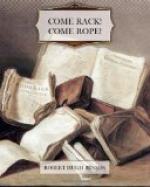The parlour in which he found himself was furnished severely and even rather sparely, owing, perhaps, he thought, to the temporary nature of the household. It was the custom in great houses to carry with the family, from house to house, all luxuries such as extra hangings or painted pictures or carpets, as well as even such things as cooking utensils; and in the Queen’s sudden removal back again from Tixall, many matters must have been neglected. The oak wainscoting was completely bare; and over the upper parts of the walls in many places the stones showed through between the ill-fitting tapestries. A sheaf of pikes stood in one corner; an oil portrait of an unknown worthy in the dress of fifty years ago hung over one of the doors; a large round oak table, with ink-horn and pounce-box, stood in the centre of the room with stools beside it: there was no hearth or chimney visible; and there was no tapestry upon the floor: a skin only lay between the windows. The priest sat down and waited.
He had enough to occupy his mind; for not only had he the thought of the character he was to sustain presently under the scrutiny of a suspicious man; but he had the prospect, as he hoped, of coming into the presence of the most-talked-of woman in Europe, and of ministering to her as a priest alone could do, in her sorest need. His hand went to his breast as he considered it, and remembered What he bore ... and he felt the tiny flat circular case press upon his heart....
For his imagination was all aflame at the thought of Mary. Not only had he been kindled again and again in the old days by poor Anthony’s talk, until the woman seemed to him half-deified already; but man after man had repeated the same tale, that she was, in truth, that which her lean cousin of England desired to be thought—a very paragon of women, innocent, holy, undefiled, yet of charm to drive men to their knees before her presence. It was said that she was as one of those strange moths which, confined behind glass, will draw their mates out of the darkness to beat themselves to death against her prison; she was exquisite, they said, in her pale beauty, and yet more exquisite in her pain; she exuded a faint and intoxicating perfume of womanliness, like a crushed herb. Yet she was to be worshipped, rather than loved—a sacrament to be approached kneeling, an incarnate breath of heaven, the more lovely from the vileness into which her life had been cast and the slanders that were about her name.... More marvellous than all was that those who knew her best and longest loved her most; her servants wept or groaned themselves into fevers if they were excluded from her too long; of her as of the Wisdom of old might it be said that, “They who ate her hungered yet, and they who drank her thirsted yet."... It was to this miracle of humanity, then, that this priest was to come....
* * * * *
He sat up suddenly, once more pressing his hand to his breast, where his Treasure lay hidden, as he heard steps crossing the paved hall outside. Then he rose to his feet and bowed as a tall man came swiftly in, followed by the apothecary.




